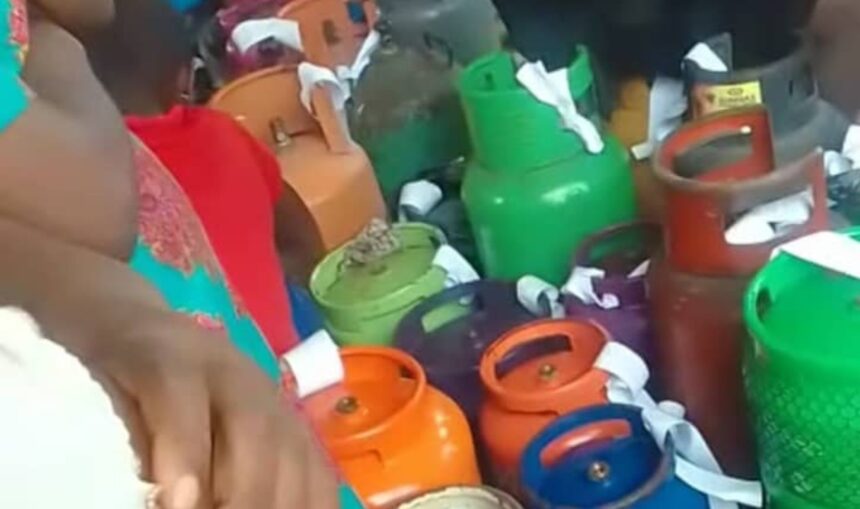… prices in South-South remain stable at ₦1,200/kg
… as consumers in Lagos, other cities queue for hours
Precious Ademisoye
Liquefied Petroleum Gas (Cooking gas) prices in Nigeria’s Southwest have spiked to between ₦1,800 and ₦2,000 per kilogram amid worsening scarcity linked to supply crisis from the Dangote Refinery.
The crisis, attributed to the recent face-off between Dangote and PENGASSAN, which was settled and suspended on October 1, 2025, following government-facilitated talks, has also been linked by industry stakeholders to deeper operational challenges within the refinery complex.
A market investigation by Advisors Reports over the weekend gathered insights from marketers and industry analysts on the causes of the scarcity and possible timelines for relief.
Our correspondents, who monitored the situation across parts of Lagos, Ogun, Oyo, and other southwestern states over the weekend, observed long queues and frustration among Nigerians as they struggled for hours to refill their gas cylinders.
Checks revealed that retail cooking gas prices have soared to about ₦2,000 per kilogram in Lagos, with even higher rates reported in some parts of the country, while prices in the South-South region, including Port Harcourt, have remained relatively lower at around ₦1,200 per kilogram.
Several consumers in Lagos recounted their ordeals amid the worsening cooking gas scarcity.
Mr. Babatunde, a resident of Abule-Egba, said, “I searched everywhere yesterday for gas. I saw that a filling station was selling, joined the queue, and when it was just three people to my turn, the gas finished.
“I left and kept searching until I found a vendor selling at ₦1,800 per kg. I had no choice but to buy,” he said.
Another consumer, Mrs. Somonu, in Agege, shared her frustration, “When I got to the gas station, they said there was no gas. I went to another place, the same thing, so I had to find an alternative.
“When I finally did, I was shocked to hear that the price per kg was ₦2,000. God help us in Nigeria,” she lamented.
Similarly, Blessing Adiaka, a Lagos resident affected by the scarcity, said, “I bought gas for ₦2,000 per kg. There was a long queue, and I spent about 45 minutes before I was attended to.”
A credible source at NIPCO, a major supplier of LPG in Nigeria, who is not authorized to speak to the press, informed Advisors Reports that the recent Dangote/PENGASSAN strike temporarily crippled supply activities and jetty operations in Apapa and other ports.
However, normalcy has since been restored, with operations resuming on the weekend days after the October 1 public holiday.
According to the source, NIPCO has been working tirelessly to cushion the impact of the disruption caused by the strike, which began the penultimate weekend and lasted through Sunday, Monday, and Tuesday before the Independence Day holiday on Wednesday.
“We are gradually getting there.
“Most of our customers are being attended to because we received vessels on Saturday and Sunday at NIPCO.
As of Monday morning, we already have trucks heading to various destinations.
“About 50 trucks were loaded over the weekend to feed the Southwest and reduce the impact of the scarcity,” he said.
The NIPCO source, therefore, assured that by Wednesday, the market would have been flooded with products.
He stated that the 11pLC, a sister company that is also another major supply, also affected by the shutdown, will commence loading at tankers at its terminal in Apapa to bring relief to the markets.
He confirmed that Dangote does not have the capacity to provide the volume needed in the LPG market and that his share is quite insignificant.
IMPACT OF DANGOTE’S RFCC UNIT
Meanwhile, part of the crisis, according to industry stakeholders, was linked to the 650,000 bpd Dangote Refinery’s Residue Fluid Catalytic Cracking (RFCC) unit, which has experienced a series of shutdowns in recent months.
The first occurred from April 7 to May 11 due to damage, another between May 15 and May 25 for mechanical issues, and the most recent was caused by catalyst leaks that forced the unit offline around late August to early September.
The RFCC fault reportedly took out about 204,000 bpd of petrol production – roughly 70 percent of the refinery’s 550,000 bpd operational capacity since it began operations in January 2024 and started producing petrol in September 2024.
Advisors Reports gathered that Dangote had earlier attributed at least one of the RFCC outages to “design issues,” which the company said contributed to the disruption.
EXPERTS
Mr. Godwin Okoduwa, Country Director CCNA, in a chat with Advisors Reports, explained that the scarcity wasn’t caused by the disagreement between Dangote and PENGASSAN.
He said, “Dangote had stopped supplying to the market like three weeks before that issue came up.
“The delay of the discharge of products at Apapa by PENGASSAN was just about two days. So before then, Dangote had issues with the RFCC, and they had to do some quick maintenance. So that lull in supply was what caused it.”
He said the volatility in market prices also played a role. “Before now, plants would normally buy in bulk, but due to recent volatility in prices, plant owners have learned to buy small because prices could change anytime.
“So that when this thing happened, because Dangote, now supplying about 50% of the market, was out of stock for a while, it caused the shortage. That was the major cause.”
He assured that, “Now that Dangote is back, it will just take a while to circulate. So the price you’re seeing is temporary. Price would normalize within a week.
“It’s just like what we experienced at the petrol stations, where there was some scarcity, but it’s gone now. That’s what will happen for the gas plant. So just a matter of time,” he said.
Mr. Okoduwa also called for long-term solutions to cushion future disruptions.
“To prevent this from happening, the Nigerian Government must find a way to have a pricing bench that allows predictability. If the industry has a way of pricing predictability, that will really help,” Okoduwa, Country Director CCNA, said.
Mr. Oladapo Olatunbosun. President of the Nigerian Association of Liquefied Petroleum Gas Marketers (NALPGAM) echoed similar sentiments in a separate interview.
According to him, the cooking gas scarcity will soon go down. It’s because there was a delay in the supply at the terminals.
He said, “And the supply is out now. By Wednesday, Thursday, it will go down.
“The scarcity is only within the western zone. There is gas in South-south, there is gas in the north, but because of the price and the maintenance they had with Dangote.”
He added, “The price went up because of the demand and supply situation. There is pressure on the limited available gas, which is why the price has gone up.
“But normalcy will come, this price will come down, and the gas will be more available in the western states,” he said.




